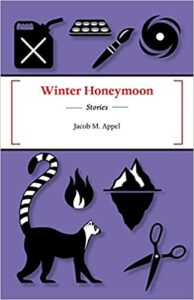by GILLIAN PERRY

Jacob M. Appel, Winter Honeymoon (Black Lawrence Press, 2020), pp. 171.
Having pursued higher education for nearly a decade, Appel has mastered how to speak to his varying interests in his stories, how to expose and build upon his intense intellectual curiosity, and ultimately how to reveal his deep and analytical understanding of the human condition. Appel’s characters in his newest collection, Winter Honeymoon: Stories, reflect a similar intellect, a parallel exploration of what it means to be human. Jacob M. Appel is not only a very accomplished writer, but also a teacher, an attorney, a doctor, and a bioethicist. It seems almost unfair that a man who possesses such clear talent in his writing is also able to grapple with the language of medicine and ethics, and the language of law. However, that is precisely what makes Appel such a talented and interesting writer—his understanding of language, and the complexities of our lives as human beings is vast and unparalleled.
The collection opens on its titular story, “Winter Honeymoon,” in which a recently widowed Edith visits her past college sweetheart, Kenneth. As they move through his artistically rendered miniature display of the world’s greatest architectural features and cities, which Kenneth calls Portable Cities due to their size, they wonder aloud about life’s “great cosmic mysteries,” life, death, art, and of course, love. The spread of characters housed in this collection share similar musings about the complexities of life, and the in between spaces of right and wrong. Sandy of “The Other Sister” is forced to reckon with her relationship with her sister, after their father’s death reveals that she has fabricated another sister in her place. In “Iceberg Potential,” protagonist Kaely has to grapple with her crush on her middle school teacher, the fact that her best friend is dating his son, and the unspeakable acts that she commits due to this infatuation. Cory from “The Apprenticeship” seemingly only wants to be a tailor at the young age of twelve—he doesn’t expect to bear witness to the trials of the Iranian family that owns the tailor’s shop for which he apprentices, and to consider the lengths people go to for their family, that particular brand of love. These characters are forced to confront the most difficult aspects of personhood—the complexities of love, the devastation of loss, the mystery of what makes a life worth something. Appel’s characters are not given easy tasks, and as such, their stories’ problems are not granted with easy solutions. Sandy must face her real sister. Kaely must face her teacher and those whom she hurts. Cory must face the Jafari family after it is reduced to fraying strings. By forcing his characters to reckon with their difficult feelings and situations, Appel is able to let the stories reach earned and natural resolutions. The reader isn’t left needing answers, needing solutions, even if the story has no answers to offer. Instead, the reader ponders along with the protagonists, feels the weight of their decisions, and braves the consequences of their actions right alongside them. Appel’s skill is in crafting beautiful, tender moments that stand alone in their stories, and though they may not be logical or entirely practical, these moments are undeniably human. I believe this inherent humanity is what makes these stories worth reading.

These moments of warmth are evident in even the most unbelievable settings that Appel crafts. In “The Appraisal,” Bert’s ex-wife Abigail reveals she intends to set herself on fire. “Before the Storm” features James as he remembers he and his father’s headlong dive into Hurricane Camille. Maggie’s husband Frank, in the final story of the collection “Fallout,” is convinced that the world is destined for apocalypse and that they must prepare. Though odd, and a bit unbelievable on the onset, these stories become quickly conceivable as Appel infuses his settings with deeply human characters. Appel does not allow himself to toy too much with the wit of his settings, as this may lead to overwrought intricacies. Also, the intrigue of the bizarre situations he has concocted could take precedent over the complex character arcs. Instead, he allows for his characters to breath, to live, to feel. As in “The Appraisal,” Bert still genuinely cares for Abigail despite the fact that he is gay (hence, the divorce), and that they have lost touch. Readers understand her resolve to go through with self-immolation, and conversely feel the pain that will be the loss of her as we see her through Bert’s eyes, “…how empty his life would be without her jibes, her ravenous laugh.” It is this small moment that fuels the energy of the climax where Abigail pours gasoline over her head, “First, by tilting the canisters, then lifting them as they yielded weight. She might have been a small child enjoying a public bath.” Bert’s care for Abigail yields this tender metaphor, the fact that even though he loves her, he’ll allow her to voluntarily burn. Appel captures this crossroads between intense care and letting go in a twisted, dark, and almost comic way.
Though Appel sticks to the hallmarks of literary fiction—beautiful imagery and language, a focus on character development, a complete story arc within a handful of pages—these stories challenge readers to draw their own conclusions, as not all of these characters are morally sound. Abby, from “Pay As You Go” hires young, handsome Trent Kendall to care for her ailing father. Rather than communicate with him once her valuables go missing, she instead interprets his playful flirting to mean that he is obviously the thief. Appel gives readers a fraught situation to unpack here—Abby’s instability prompted by the inevitable and upcoming loss of her father, a history of valuables supposedly going missing with past aids, her obvious attraction to Trent and therefore her own clouded judgement regarding him. And yet, I had a difficult time feeling sorry for Abby, as her conclusions seem self-indulgent, and Appel’s shaping of her implies she is always seeking something more. As Chekov once challenged his readers, Appel’s readers must be able to grapple with the narrator’s telling of events and the actual events, reconciling their own feelings about the characters and the actuality of the plots. “Pay as You Go,” like all of the stories in Winter Honeymoon does not dwell, does not linger. Its brevity allows for the reader to see just enough to draw their own conclusions. What I find myself lingering on after reading this collection is the beautiful prose, the delicate relationships Appel has crafted, and the captivating (and yet not overworked) frames for his stories. I don’t think I genuinely liked all of the characters in this collection, though the more complicated characters, like Abby, are who I did find the most interesting.
Anton Chekhov once said, “When men ask me how I know so much about men, they get a simple answer: everything I know about men, I learned from me.” I believe the same could be said for Appel, whose accomplishments beyond writing have given him the insular knowledge of humanity required to render such complex and interesting stories. In fact, Appel and Chekhov have a lot in common. Both men were physicians and prolific writers. Both men challenge the short story form to reveal more about character, to rely less on beautiful imagery and language to tell a story. In his most recent years, Appel has pursued a degree in playwriting, and written a fair number of plays. Is the next Cherry Orchard or the next The Seagull swimming around in Appel’s brain at this very moment? If Winter Honeymoon is any indication, I would say without a doubt.

